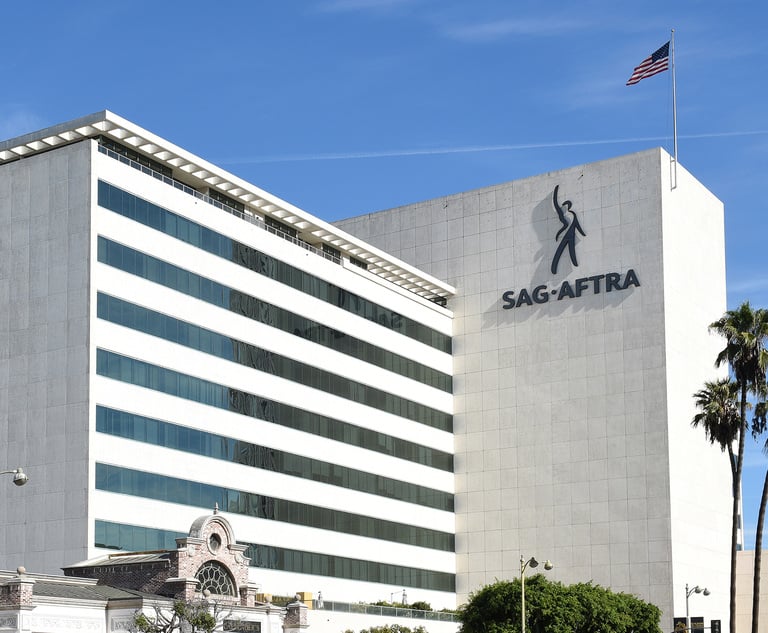 Uniondale, New York, Feb. 13, 1975: Robert Plant and Jimmy Page of Led Zeppelin perform at Nassau Coliseum on their 1975 North American tour. Photo: Shutterstock.com
Uniondale, New York, Feb. 13, 1975: Robert Plant and Jimmy Page of Led Zeppelin perform at Nassau Coliseum on their 1975 North American tour. Photo: Shutterstock.comOne More Chorus for 'Stairway to Heaven' at Ninth Circuit
An en banc panel will hear the copyright dispute over the first few measures of the 1970s Led Zeppelin classic.
June 10, 2019 at 06:46 PM
3 minute read
There's a lady who's sure, but the Ninth Circuit isn't when it comes to a copyright case involving Led Zeppelin's “Stairway to Heaven.”
The full court agreed Monday to review a three-judge panel decision that ordered a new trial for the estate of songwriter Randy Wolfe, which alleges that the first few measures of the '70s classic copies from a song called Taurus that Wolfe composed a few years earlier.
Led Zeppelin's Robert Plant and Jimmy Page and publisher Warner/Chappell Music Inc. had escaped liability at trial. They argued the Ninth Circuit's decision will make it too easy to copyright simple chromatic scales, arpeggios and short sequences of notes.
They're backed by an amicus curiae group of musicians and producers. “At the very minimum, these rulings are certain to cause substantial confusion among songwriters, who only have twelve notes with which to work in the first place,” Edwin McPherson of McPherson Rane wrote for the amici. “Songwriters need at least some certainty as to what basic elements of music are free for all to use.”
Francis Malofiy of Francis Alexander, who represents the trustee of Wolfe's estate, Michael Skidmore, asked for rehearing too. While Malofiy contends the decision was mostly correct, he argued it erred by holding that the sheet music deposited with the Copyright Office determines the scope of copyright for pre-1978 recordings. “In effect, most blues, jazz, folk and rock and roll music composed before 1978 is now no longer copyrighted due to the panel's ruling,” Malofiy argues.
Judge Richard Paez led the three-judge panel that originally ruled last September. He wrote that U.S. District Judge R. Gary Klausner should have instructed jurors that the selection and arrangement of unprotectable elements can be protected expression. A simple descending chromatic scale used in combination with other elements in an original manner could warrant copyright protection, Paez wrote.
And even though the deposit copy defines the scope of the copyright, Klausner should have let jurors hear a recording of Taurus so they could better evaluate Page's testimony about his access to the song, Paez wrote. (Led Zeppelin and Wolfe's band Spirit occasionally toured together, and Page acknowledged owning an album that contains the song.)
Plant, Page and Warner/Chappell argued that en banc review is necessary to decide “a foundational question in every copyright case”—whether substantial similarity between the works or virtual identity is necessary to prove infringement. “This court has consistently required virtual identity when the claimed similarity is the selection and arrangement of unprotected elements,” argued the band's lawyer, Peter Anderson of the Law Offices of Peter J. Anderson.
Anderson argued the Ninth Circuit has gotten away from that standard in the Led Zeppelin case and the recent battle over the “Blurred Lines” song between Pharrell Williams and the heirs of Marvin Gaye. Judge Jacqueline Nguyen, who dissented in Williams v. Gaye, “noted the error,” he wrote.
This content has been archived. It is available through our partners, LexisNexis® and Bloomberg Law.
To view this content, please continue to their sites.
Not a Lexis Subscriber?
Subscribe Now
Not a Bloomberg Law Subscriber?
Subscribe Now
NOT FOR REPRINT
© 2024 ALM Global, LLC, All Rights Reserved. Request academic re-use from www.copyright.com. All other uses, submit a request to [email protected]. For more information visit Asset & Logo Licensing.
You Might Like
View All


'Transforming Children Into ATMs'?: Roblox, Epic Games Sued for Allegedly Fueling Addictive Behavior in Minors

SAG-AFTRA Union Health Plan Slammed With Data Breach Class Actions in Wake of Phishing Attack
Trending Stories
- 1Distressed M&A: Mass Torts, Bankruptcy and Furthering the Search for Consensus: Another Purdue Decision
- 2For Safer Traffic Stops, Replace Paper Documents With ‘Contactless’ Tech
- 3As Second Trump Administration Approaches, Businesses Brace for Sweeping Changes to Immigration Policy
- 4General Warrants and ESI
- 5GC Pleads Guilty to Embezzling $7.4 Million From 3 Banks
Who Got The Work
Michael G. Bongiorno, Andrew Scott Dulberg and Elizabeth E. Driscoll from Wilmer Cutler Pickering Hale and Dorr have stepped in to represent Symbotic Inc., an A.I.-enabled technology platform that focuses on increasing supply chain efficiency, and other defendants in a pending shareholder derivative lawsuit. The case, filed Oct. 2 in Massachusetts District Court by the Brown Law Firm on behalf of Stephen Austen, accuses certain officers and directors of misleading investors in regard to Symbotic's potential for margin growth by failing to disclose that the company was not equipped to timely deploy its systems or manage expenses through project delays. The case, assigned to U.S. District Judge Nathaniel M. Gorton, is 1:24-cv-12522, Austen v. Cohen et al.
Who Got The Work
Edmund Polubinski and Marie Killmond of Davis Polk & Wardwell have entered appearances for data platform software development company MongoDB and other defendants in a pending shareholder derivative lawsuit. The action, filed Oct. 7 in New York Southern District Court by the Brown Law Firm, accuses the company's directors and/or officers of falsely expressing confidence in the company’s restructuring of its sales incentive plan and downplaying the severity of decreases in its upfront commitments. The case is 1:24-cv-07594, Roy v. Ittycheria et al.
Who Got The Work
Amy O. Bruchs and Kurt F. Ellison of Michael Best & Friedrich have entered appearances for Epic Systems Corp. in a pending employment discrimination lawsuit. The suit was filed Sept. 7 in Wisconsin Western District Court by Levine Eisberner LLC and Siri & Glimstad on behalf of a project manager who claims that he was wrongfully terminated after applying for a religious exemption to the defendant's COVID-19 vaccine mandate. The case, assigned to U.S. Magistrate Judge Anita Marie Boor, is 3:24-cv-00630, Secker, Nathan v. Epic Systems Corporation.
Who Got The Work
David X. Sullivan, Thomas J. Finn and Gregory A. Hall from McCarter & English have entered appearances for Sunrun Installation Services in a pending civil rights lawsuit. The complaint was filed Sept. 4 in Connecticut District Court by attorney Robert M. Berke on behalf of former employee George Edward Steins, who was arrested and charged with employing an unregistered home improvement salesperson. The complaint alleges that had Sunrun informed the Connecticut Department of Consumer Protection that the plaintiff's employment had ended in 2017 and that he no longer held Sunrun's home improvement contractor license, he would not have been hit with charges, which were dismissed in May 2024. The case, assigned to U.S. District Judge Jeffrey A. Meyer, is 3:24-cv-01423, Steins v. Sunrun, Inc. et al.
Who Got The Work
Greenberg Traurig shareholder Joshua L. Raskin has entered an appearance for boohoo.com UK Ltd. in a pending patent infringement lawsuit. The suit, filed Sept. 3 in Texas Eastern District Court by Rozier Hardt McDonough on behalf of Alto Dynamics, asserts five patents related to an online shopping platform. The case, assigned to U.S. District Judge Rodney Gilstrap, is 2:24-cv-00719, Alto Dynamics, LLC v. boohoo.com UK Limited.
Featured Firms
Law Offices of Gary Martin Hays & Associates, P.C.
(470) 294-1674
Law Offices of Mark E. Salomone
(857) 444-6468
Smith & Hassler
(713) 739-1250






